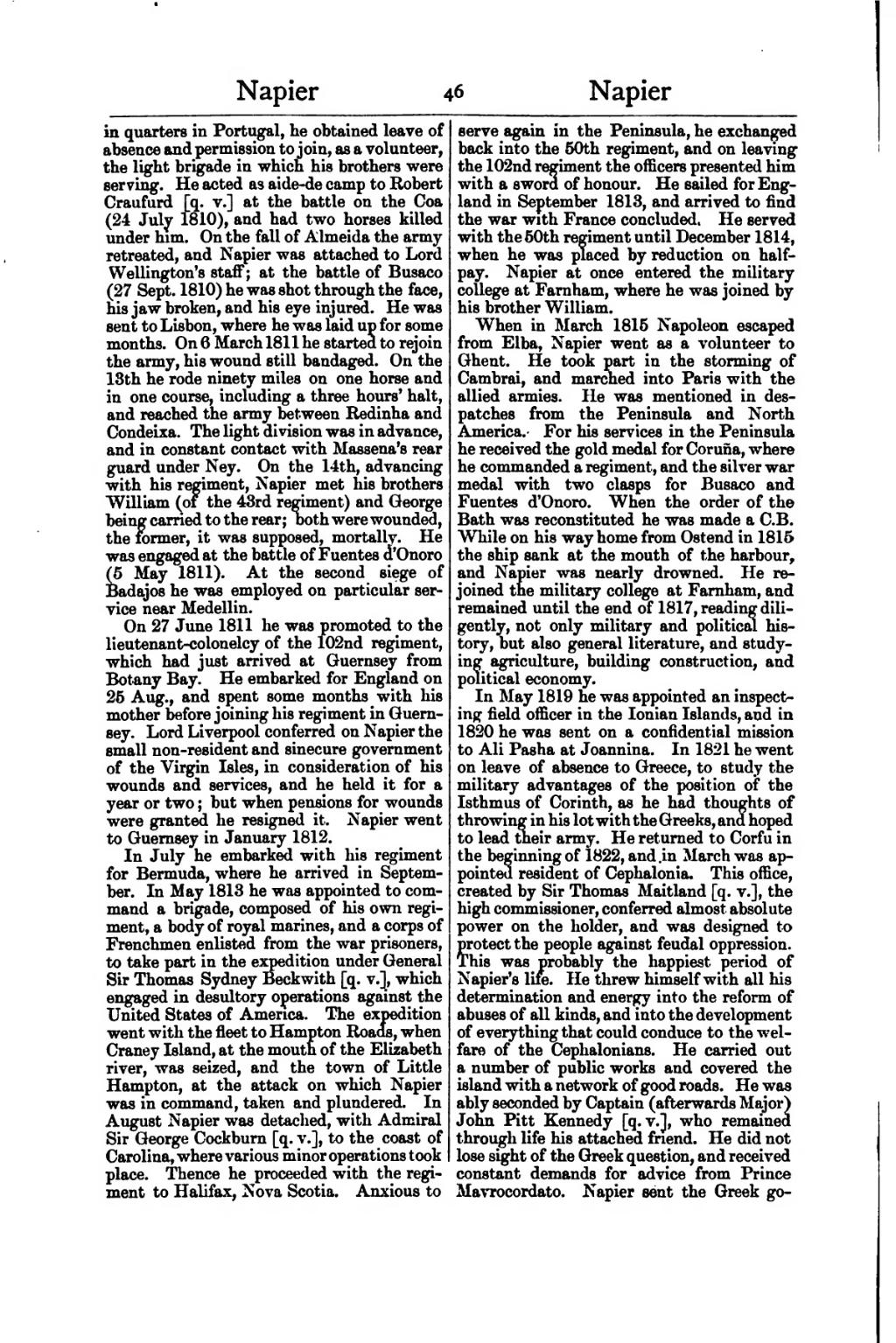in quarters in Portugal, he obtained leave of absence and permission to join, as a volunteer, the light brigade in which his brothers were serving. He acted as aide-de camp to Robert Craufurd [q. v.] at the battle on the Coa (24 July 1810), and had two horses killed under him. On the fall of Almeida the army retreated, and Napier was attached to Lord Wellington's staff; at the battle of Busaco (27 Sept. 1810) he was shot through the face, his jaw broken, and his eye injured. He was sent to Lisbon, where he was laid up for some months. On 6 March 1811 he started to rejoin the army, his wound still bandaged. On the 13th he rode ninety miles on one horse and in one course, including a three hours' halt, and reached the army between Redinha and Condeixa. The light division was in advance, and in constant contact with Massena's rear guard under Ney. On the 14th, advancing with his regiment, Napier met his brothers William (of the 43rd regiment) and George being carried to the rear; both were wounded, the former, it was supposed, mortally. He was engaged at the battle of Fuentes d'Onoro (5 May 1811). At the second siege of Badajos he was employed on particular service near Medellin.
On 27 June 1811 he was promoted to the lieutenant-colonelcy of the 102nd regiment, which had just arrived at Guernsey from Botany Bay. He embarked for England on 25 Aug., and spent some months with his mother before joining his regiment in Guernsey. Lord Liverpool conferred on Napier the small non-resident and sinecure government of the Virgin Isles, in consideration of his wounds and services, and he held it for a year or two; but when pensions for wounds were granted he resigned it. Napier went to Guernsey in January 1812.
In July he embarked with his regiment for Bermuda, where he arrived in September. In May 1813 he was appointed to command a brigade, composed of his own regiment, a body of royal marines, and a corps of Frenchmen enlisted from the war prisoners, to take part in the expedition under General Sir Thomas Sydney Beckwith [q. v.], which engaged in desultory operations against the United States of America. The expedition went with the fleet to Hampton Roads, when Craney Island, at the mouth of the Elizabeth river, was seized, and the town of Little Hampton, at the attack on which Napier was in command, taken and plundered. In August Napier was detached, with Admiral Sir George Cockburn [q. v.], to the coast of Carolina, where various minor operations took place. Thence he proceeded with the regiment to Halifax, Nova Scotia. Anxious to serve again in the Peninsula, he exchanged back into the 50th regiment, and on leaving the 102nd regiment the officers presented him with a sword of honour. He sailed for England in September 1813, and arrived to find the war with France concluded. He served with the 50th regiment until December 1814, when he was placed by reduction on half-pay. Napier at once entered the military college at Farnham, where he was joined by his brother William.
When in March 1815 Napoleon escaped from Elba, Napier went as a volunteer to Ghent. He took part in the storming of Cambrai, and marched into Paris with the allied armies. He was mentioned in despatches from the Peninsula and North America. For his services in the Peninsula he received the gold medal for Coruña, where he commanded a regiment, and the silver war medal with two clasps for Busaco and Fuentes d'Onoro. When the order of the Bath was reconstituted he was made a C.B. While on his way home from Ostend in 1815 the ship sank at the mouth of the harbour, and Napier was nearly drowned. He rejoined the military college at Farnham, and remained until the end of 1817, reading diligently, not only military and political history, but also general literature, and studying agriculture, building construction, and political economy.
In May 1819 he was appointed an inspecting field officer in the Ionian Islands, and in 1820 he was sent on a confidential mission to Ali Pasha at Joannina. In 1821 he went on leave of absence to Greece, to study the military advantages of the position of the Isthmus of Corinth, as he had thoughts of throwing in his lot with the Greeks, and hoped to lead their army. He returned to Corfu in the beginning of 1822, and in March was appointed resident of Cephalonia. This office, created by Sir Thomas Maitland [q. v.], the high commissioner, conferred almost absolute power on the holder, and was designed to protect the people against feudal oppression. This was probably the happiest period of Napier's life. He threw himself with all his determination and energy into the reform of abuses of all kinds, and into the development of everything that could conduce to the welfare of the Cephalonians. He carried out a number of public works and covered the island with a network of good roads. He was ably seconded by Captain (afterwards Major) John Pitt Kennedy [q. v.], who remained through life his attached friend. He did not lose sight of the Greek question, and received constant demands for advice from Prince Mavrocordato. Napier sent the Greek go-
